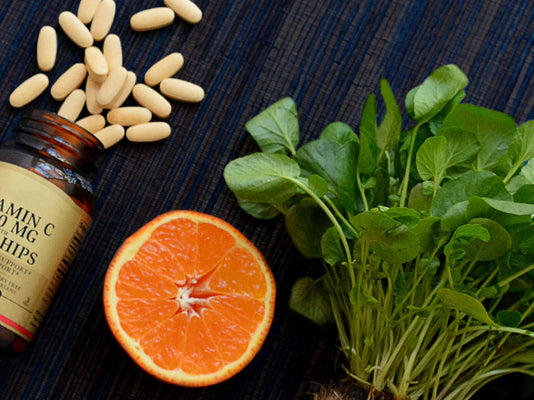No matter how healthy you eat or what type of diet you follow - vegan, vegetarian, or omnivorous- you need to keep an eye out for nutrient deficiencies. If you’re a vegan, you know that a well-planned diet can help keep the most common pitfalls at bay.
This means you need to incorporate plenty of whole grains, legumes, fresh fruits, and veggies in your daily diet, plus a handful of nuts or seeds. But, even if you check all these boxes you may fall short on some key nutrients as a vegan and may need to find plant-based, vegan multivitamin supplements to fill the dietary gaps.
Nutrients Vegans Should Look For in Vitamin Supplements
Vegans can get plenty of essential vitamins and nutrients from plant-based sources. But, this may be tough for some key nutrients like Vitamin D, B12, protein, zinc, calcium, and iodine.
Vitamin B12
Vitamin B12 helps in improving brain health and energy-yielding metabolism. Meat, fish, eggs, and milk are the best sources of these nutrients but are all a big “no” in a vegan diet.
While fortified foods like nutritional yeast may give you a small amount of what you need, supplementing with a vegan multivitamin is a good idea.
Omega-3 DHA
Omega-3 fatty acids in your diet promote good heart health and vision. The primary source of this super important nutrient is cold-water fish, which vegans refrain from. While flax, pumpkin seeds, walnuts, and chia seeds are excellent sources of Omega-3 DHA, these might not be feasible for everyone.
It’s also hard to find a vegan-friendly supplement for this nutrient since most multivitamins use ingredients derived from fish oil. However, there are some great options out there for vegans like multivitamin gummies which are also 100% halal.

Iron
Needless to say, iron is an extremely vital nutrient, since it helps support blood building and oxygen transport to all our organs and cells. While iron is found in plant-based food options like legumes and spinach, some of the best sources come from animals.
Women who are menstruating, pregnant, or postpartum may have higher iron needs, especially if they are vegan too.
So, it’s a good idea to add multivitamins in the form of tablets or gummies to your diet to stave off iron deficiencies. If you’re on the lookout for Iron supplements, try to find ones that also contain Vitamin C, as this helps absorb the iron better.
In addition, Vitamin C also boosts your immune system.
Vitamin D
This nutrient helps regulate the amount of calcium and phosphate in our bodies while keeping our bones, teeth, and muscles healthy. A deficiency of Vitamin D can cause bone deformities like rickets in kids, whereas in adults, this could lead to osteomalacia, a condition that primarily causes bone pain.
Its best source is direct exposure to sunlight. While fortified foods like milk (both cow’s and vegan milk) are also good sources, taking a supplement can be beneficial to both omnivores and vegans, especially during winters.
Until recent years, barely any company offered a vegan version of Vitamin D3, and they had to buy the more expensive and less potent Vitamin D2. Today, several brands offer vegan-friendly D3 supplements.

How To Determine if Multivitamins Are Vegan?
If you have determined that you need to take multivitamin supplements to enhance your well-being, you might now be wondering how to know if a supplement option is vegan. Finding a supplement that suits your values as well as unique nutritional needs can be quite tough.
Remember, taking supplements doesn’t mean that you’re not healthy, or that you can’t continue following your vegan lifestyle. Listed below are two fool-proof ways to determine if your multivitamins are vegan.
Check the ingredient List Carefully
While many multivitamins use plant-based ingredients, some traditional ones may use ingredients that aren’t necessarily vegan, and may not be completely transparent about it. So, read the ingredient list on the pack or before purchasing the supplements online.
Some ingredients to look out for include sheep’s wool, shellac or beetle poop, yeast, and cow or fish bones and hooves. Some may contain gelatin or other nutrients derived from animal sources like fish oil.
If the ingredient list mentions gelatin or yeast but doesn’t specify what the gelatin is made from or what kind of yeast is used, you may want to do some further digging. For example, vegan gummies from brands like Chewwies use a component called pectin which is naturally derived from fruits to produce the jelly texture.
Glazing agents like carnauba wax and malt syrups which are vegan extracts are used to produce the shine. If you have any questions about the ingredients we use, you can get to know more here, and make a completely informed decision.

Check for Vegan Certification
One of the easiest ways to confirm whether your preferred multivitamin is vegan is to check for certification regarding the same. Most products for vegans will state that they’re vegan-friendly either on their packaging or their official website.
Also, look for other certifications that may indicate that the product is vegan-friendly including - no artificial preservatives, gelatin-free, cruelty-free (if it follows Good Manufacturing Process or GMP), and free of animal-derived products.
Final Words
Sometimes, even if you follow a well-planned vegan diet you may not get a sufficient amount of all the nutrients that you need. Some nutrients that you may need if you follow a vegan diet include iron, Omega-3, Vitamin B12, Vitamin D3, and calcium.
In such cases, you could consider taking a multivitamin supplement to enhance your well-being and stay healthy and hearty. Vegan-friendly supplements like tablets or gummies are made from plant-based products and do not contain gelatin, shellac, yeast, or any other animal-derived ingredients. So, they are a safe and healthy choice for you!


